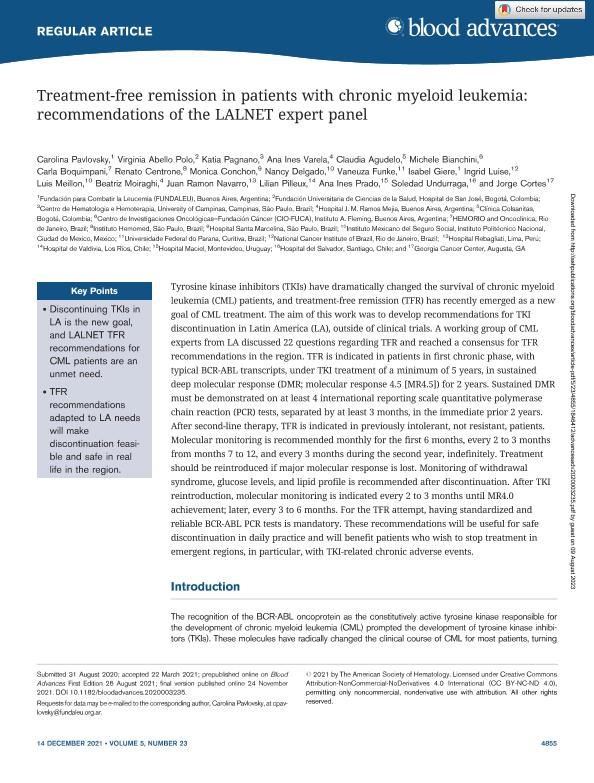Mostrar el registro sencillo del ítem
dc.contributor.author
Pavlovsky, Carolina

dc.contributor.author
Polo, Virginia Abello
dc.contributor.author
Pagnano, Katia
dc.contributor.author
Varela, Ana Ines
dc.contributor.author
Agudelo, Claudia
dc.contributor.author
Bianchini, Michele

dc.contributor.author
Boquimpani, Carla
dc.contributor.author
Centrone, Renato
dc.contributor.author
Conchon, Monica
dc.contributor.author
Delgado, Nancy
dc.contributor.author
Funke, Vaneuza
dc.contributor.author
Giere, Isabel
dc.contributor.author
Luise, Ingrid
dc.contributor.author
Meillon, Luis
dc.contributor.author
Moiraghi, Beatriz
dc.contributor.author
Navarro, Juan Ramon
dc.contributor.author
Pilleux, Lilian
dc.contributor.author
Prado, Ana Ines
dc.contributor.author
Undurraga, Soledad
dc.contributor.author
Cortes, Jorge
dc.date.available
2023-08-09T16:05:51Z
dc.date.issued
2021-12
dc.identifier.citation
Pavlovsky, Carolina; Polo, Virginia Abello; Pagnano, Katia; Varela, Ana Ines; Agudelo, Claudia; et al.; Treatment free remission in patients with chronic myeloid leukemia: recommendations of LALNET expert panel; American Society of Hematology; Blood Advances; 5; 23; 12-2021; 4855-4863
dc.identifier.issn
2473-9537
dc.identifier.uri
http://hdl.handle.net/11336/207640
dc.description.abstract
Tyrosine kinase inhibitors (TKIs) have dramatically changed the survival of chronic myeloid leukemia (CML) patients, and treatment-free remission (TFR) has recently emerged as a new goal of CML treatment. The aim of this work was to develop recommendations for TKI discontinuation in Latin America (LA), outside of clinical trials. A working group of CML experts from LA discussed 22 questions regarding TFR and reached a consensus for TFR recommendations in the region. TFR is indicated in patients in first chronic phase, with typical BCR-ABL transcripts, under TKI treatment of a minimum of 5 years, in sustained deep molecular response (DMR; molecular response 4.5 [MR4.5]) for 2 years. Sustained DMR must be demonstrated on at least 4 international reporting scale quantitative polymerase chain reaction (PCR) tests, separated by at least 3 months, in the immediate prior 2 years. After second-line therapy, TFR is indicated in previously intolerant, not resistant, patients. Molecular monitoring is recommended monthly for the first 6 months, every 2 to 3 months from months 7 to 12, and every 3 months during the second year, indefinitely. Treatment should be reintroduced if major molecular response is lost. Monitoring of withdrawal syndrome, glucose levels, and lipid profile is recommended after discontinuation. After TKI reintroduction, molecular monitoring is indicated every 2 to 3 months until MR4.0 achievement; later, every 3 to 6 months. For the TFR attempt, having standardized and reliable BCR-ABL PCR tests is mandatory. These recommendations will be useful for safe discontinuation in daily practice and will benefit patients who wish to stop treatment in emergent regions, in particular, with TKI-related chronic adverse events.
dc.format
application/pdf
dc.language.iso
eng
dc.publisher
American Society of Hematology

dc.rights
info:eu-repo/semantics/openAccess
dc.rights.uri
https://creativecommons.org/licenses/by-nc-sa/2.5/ar/
dc.subject
CML
dc.subject
Discontinuation
dc.subject
Treatment
dc.subject.classification
Oncología

dc.subject.classification
Medicina Clínica

dc.subject.classification
CIENCIAS MÉDICAS Y DE LA SALUD

dc.title
Treatment free remission in patients with chronic myeloid leukemia: recommendations of LALNET expert panel
dc.type
info:eu-repo/semantics/article
dc.type
info:ar-repo/semantics/artículo
dc.type
info:eu-repo/semantics/publishedVersion
dc.date.updated
2023-08-09T12:49:56Z
dc.journal.volume
5
dc.journal.number
23
dc.journal.pagination
4855-4863
dc.journal.pais
Estados Unidos

dc.journal.ciudad
Washington
dc.description.fil
Fil: Pavlovsky, Carolina. Fundación Cáncer. Centro de Investigaciones Oncológicas; Argentina
dc.description.fil
Fil: Polo, Virginia Abello. Hospital de San José, Bogotá, Colombia; Colombia
dc.description.fil
Fil: Pagnano, Katia. Universidade Estadual de Campinas; Brasil
dc.description.fil
Fil: Varela, Ana Ines. Gobierno de la Ciudad de Buenos Aires. Hospital General de Agudos "Ramos Mejía"; Argentina
dc.description.fil
Fil: Agudelo, Claudia. Clínica Colsanitas; Colombia
dc.description.fil
Fil: Bianchini, Michele. Fundación Cáncer; Argentina. Consejo Nacional de Investigaciones Científicas y Técnicas; Argentina
dc.description.fil
Fil: Boquimpani, Carla. No especifíca;
dc.description.fil
Fil: Centrone, Renato. No especifíca;
dc.description.fil
Fil: Conchon, Monica. No especifíca;
dc.description.fil
Fil: Delgado, Nancy. INSTITUTO POLITÉCNICO NACIONAL (IPN);
dc.description.fil
Fil: Funke, Vaneuza. No especifíca;
dc.description.fil
Fil: Giere, Isabel. Fundación Cáncer; Argentina
dc.description.fil
Fil: Luise, Ingrid. No especifíca;
dc.description.fil
Fil: Meillon, Luis. INSTITUTO POLITÉCNICO NACIONAL (IPN);
dc.description.fil
Fil: Moiraghi, Beatriz. Gobierno de la Ciudad de Buenos Aires. Hospital General de Agudos "Ramos Mejía"; Argentina
dc.description.fil
Fil: Navarro, Juan Ramon. No especifíca;
dc.description.fil
Fil: Pilleux, Lilian. No especifíca;
dc.description.fil
Fil: Prado, Ana Ines. Hospital Maciel; Uruguay
dc.description.fil
Fil: Undurraga, Soledad. Hospital del Salvador; Chile
dc.description.fil
Fil: Cortes, Jorge. No especifíca;
dc.journal.title
Blood Advances
dc.relation.alternativeid
info:eu-repo/semantics/altIdentifier/doi/http://dx.doi.org/10.1182/bloodadvances.2020003235
Archivos asociados
